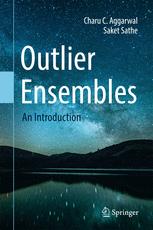

Most ebook files are in PDF format, so you can easily read them using various software such as Foxit Reader or directly on the Google Chrome browser.
Some ebook files are released by publishers in other formats such as .awz, .mobi, .epub, .fb2, etc. You may need to install specific software to read these formats on mobile/PC, such as Calibre.
Please read the tutorial at this link. https://ebooknice.com/page/post?id=faq
We offer FREE conversion to the popular formats you request; however, this may take some time. Therefore, right after payment, please email us, and we will try to provide the service as quickly as possible.
For some exceptional file formats or broken links (if any), please refrain from opening any disputes. Instead, email us first, and we will try to assist within a maximum of 6 hours.
EbookNice Team

Status:
Available0.0
0 reviewsThis book discusses a variety of methods for outlier ensembles and organizes them by the specific principles with which accuracy improvements are achieved. In addition, it covers the techniques with which such methods can be made more effective. A formal classification of these methods is provided, and the circumstances in which they work well are examined. The authors cover how outlier ensembles relate (both theoretically and practically) to the ensemble techniques used commonly for other data mining problems like classification. The similarities and (subtle) differences in the ensemble techniques for the classification and outlier detection problems are explored. These subtle differences do impact the design of ensemble algorithms for the latter problem. This book can be used for courses in data mining and related curricula. Many illustrative examples and exercises are provided in order to facilitate classroom teaching. A familiarity is assumed to the outlier detection problem and also to generic problem of ensemble analysis in classification. This is because many of the ensemble methods discussed in this book are adaptations from their counterparts in the classification domain. Some techniques explained in this book, such as wagging, randomized feature weighting, and geometric subsampling, provide new insights that are not available elsewhere. Also included is an analysis of the performance of various types of base detectors and their relative effectiveness. The book is valuable for researchers and practitioners for leveraging ensemble methods into optimal algorithmic design.